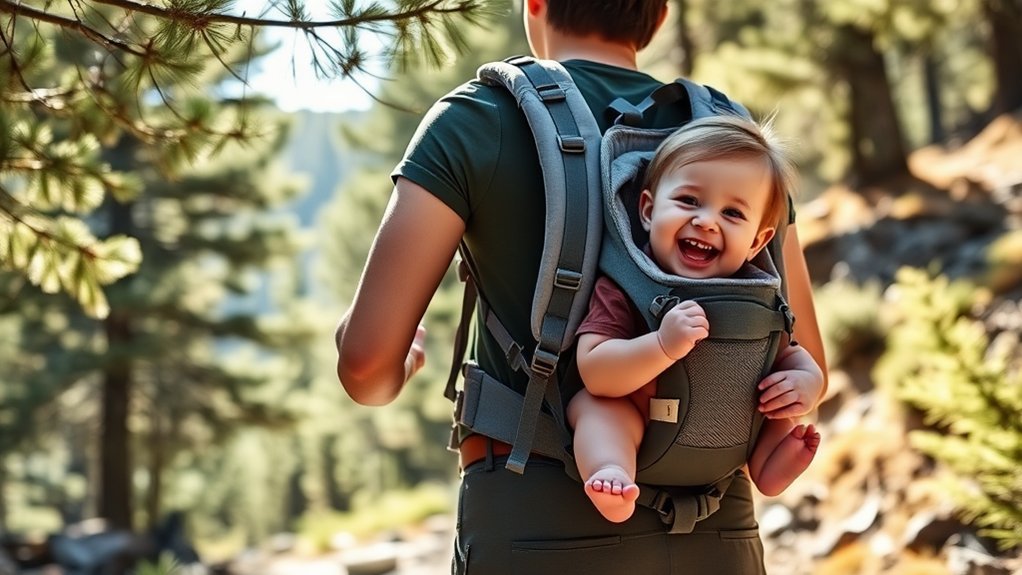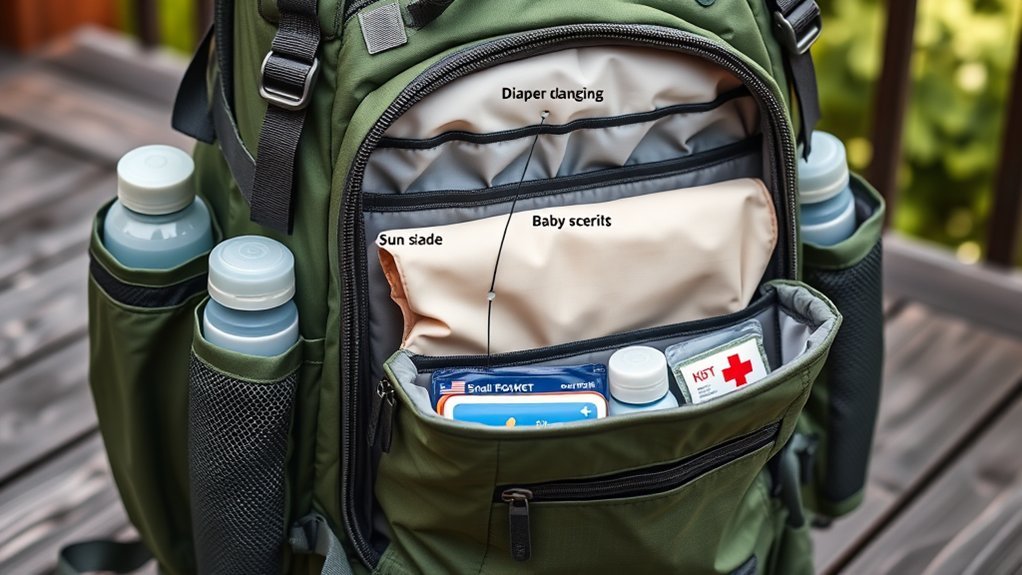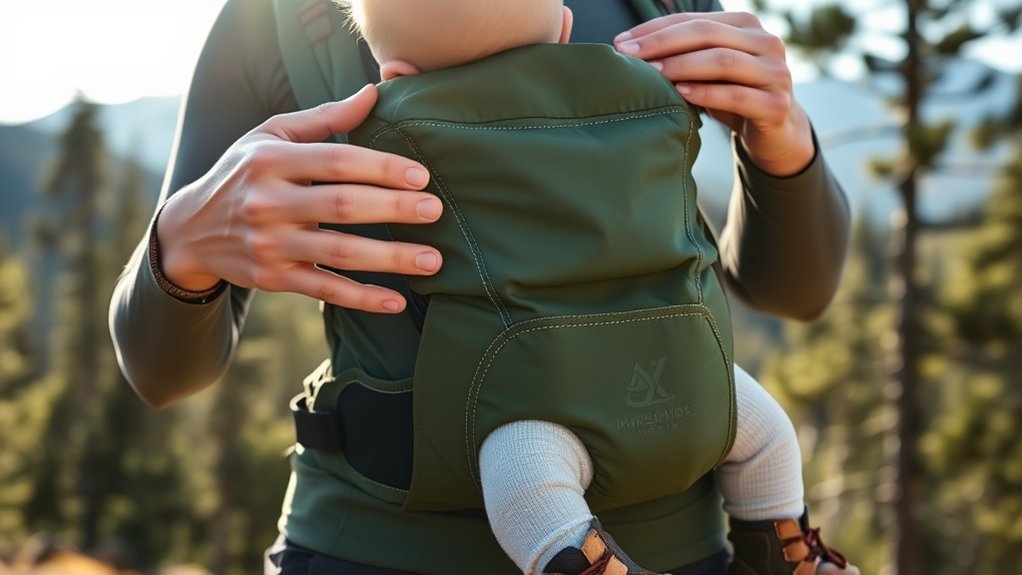Getting out on the trails with your tiny adventurer isn't just possible – it's awesome. After countless miles testing baby carriers through mud, rocks, and switchbacks, I can tell you straight up: the right hiking backpack makes all the difference. Sure, hauling a little one up a mountain sounds intense, but with these 2024 carriers, you'll both be crushing those trails like pros. I've sweated through every climb to find which packs actually work, from the fancy Deuter Kid Comfort to solid budget options that won't drain your wallet. Whether you're planning quick morning hikes or full-day mountain missions, let's gear up and get your family into the wild.
Top-Rated Baby Hiking Backpacks of 2024
When it comes to exploring the great outdoors with your little one, we've found the best baby hiking backpacks of 2024 that'll keep both parent and child comfortable on the trail.
The Deuter Kid Comfort leads our picks with its cushy adjustable straps and suede cockpit, perfect for those long adventures. If you're after the roomiest option, we love the Osprey Poco's generous child seat and reliable suspension system. For shorter parents or quick trips, the lightweight Deuter Kid Comfort Active SL is our go-to choice.
The Kelty Journey PerfectFIT Elite, Deuter Kid Comfort Pro, and Osprey Poco LT round out our top recommendations with their feature-rich designs and comfortable fit. Can't splash out on a new carrier? We've discovered that renting or buying used models can be a smart way to get premium comfort without breaking the bank.
Essential Features to Consider When Choosing a Carrier
Selecting the right baby hiking carrier makes all the difference between happy trails and tough treks. When we're shopping for carriers, let's focus on features that deliver comfort and safety for both parent and child.
We'll want adjustable torso length, harness, and waist belt to guarantee a perfect fit as our little ones grow. Padded shoulder straps, padded waist belt, and back panel keep us comfortable on long hikes. For our precious cargo, a supportive seat, headrest, and well-designed leg openings prevent discomfort.
Safety is non-negotiable – look for secure 5-point harnesses to keep your child snug and stable. Don't forget about breathability; mesh panels and ventilation zones help avert overheating during those sunny adventures on the trail.
Comfort and Safety: What Parents Need to Know

How do we guarantee our little hiking companions stay safe and comfy on the trail? Let's start with proper fit – it's absolutely essential for both parent and child. We'll want to look for padded shoulder straps and a contoured waist belt that distribute weight evenly, making those long hikes more enjoyable.
Safety comes first with a sturdy metal frame and five-point harness system keeping our precious cargo secure. The carrier should be adjustable to grow with your child, featuring customizable seat height and headrest positions.
Every child carrier must have a solid frame and proper harness – your little one's security is non-negotiable on the trail.
We also recommend choosing breathable, lightweight materials to prevent overheating during active adventures.
Don't forget to carefully follow the manufacturer's guidelines for weight limits and proper use. When we take these comfort and safety features seriously, we're setting ourselves up for countless memorable trail adventures together.
Weight Capacity and Age Guidelines
The right weight capacity and age guidelines make all the difference in choosing a safe, comfortable hiking backpack for your little one. We've got everything you need to know about selecting the perfect carrier for your outdoor adventures.
Most hiking carriers can handle between 40-50 pounds of combined kid and pack weight, giving you plenty of room for growth.
Your child should be at least 6 months old before using a backpack carrier – stick to front carriers for younger babies.
Most packs will serve you well until your child reaches about 4 years old.
Look for carriers with adjustable torso lengths that grow with your child.
Remember to always check your specific pack's guidelines – each carrier has its own weight and age limits to keep your little hiker safe on the trail.
Storage Solutions and Practical Accessories

Once you've found a carrier that fits your child's size and age, let's look at what makes hiking with your little one even more convenient. Modern carriers come packed with smart storage solutions – from waist belt pockets perfect for snacks to side pockets that keep water bottles within easy reach.
When you're hitting the trails, you'll love having separate compartments or attachment points for your diaper bag and gear.
We can't forget about those must-have accessories that make outdoor adventures safer and more comfortable. Sunshades protect your little explorer from harsh elements, while kickstands keep the carrier stable during breaks. Add-ons like foot stirrups and headrests boost comfort, and reflective strips guarantee visibility on darker trails. These practical features transform a basic carrier into your ultimate hiking companion.
Premium Vs Budget Options: Making the Right Choice
Making smart choices between premium and budget hiking carriers can greatly impact your outdoor adventures with little ones. We've found that investing in premium carriers often pays off in the long run, especially for regular hikers.
Premium carriers like the Deuter Kid Comfort and Osprey Poco Premium offer superior comfort features, higher weight capacity, and better adjustability. The Osprey Poco LT balances premium quality with improved packability for travelers.
Budget options like LuvdBaby Premium provide basic functionality at lower costs but compromise on comfort. Investment-level carriers typically last longer and can be used for multiple children.
While budget options might seem attractive initially, we recommend considering premium carriers if you're planning frequent hikes. The enhanced comfort, durability, and adjustability make the extra investment worthwhile for both you and your little adventurer.
Tips for Adjusting and Fitting Your Baby Carrier

Properly adjusting your baby hiking backpack guarantees both you and your little one stay comfortable throughout the journey. We'll help you achieve that great fit by focusing on key adjustments. Start with the torso adjustment to match your height, then secure the hipbelt and mesh padding around your waist.
Next, we'll fine-tune those shoulder straps and hip supports for ideal weight distribution.
The easy to adjust features on today's carriers mean you won't struggle with complicated straps and waist buckles. Most packs offer quick-release mechanisms for ease of use, while comfort design elements verify proper weight distribution. Remember to test the fit by walking around your home before hitting the trails – a properly adjusted carrier should feel like a natural extension of your body.
Frequently Asked Questions
What Is the Best Backpack for a Baby Hiking?
We'll recommend the Deuter Kid Comfort for its superior comfort features, safety harness, and breathable pack material. It's got great storage, adjustability, water resistance, and sun protection for trail adventures.
What Age Can Babies Go in a Hiking Backpack?
We'll start hitting trails with our little ones at 6 months when they've got solid neck control, but let's watch their comfort level and weight capacity through 2 years, always prioritizing proper positioning and safety.
What Is the Best Baby Carrier for Hiking?
We recommend the Kelty Journey PerfectFIT Elite, offering superior comfort, ergonomic adjustments, breathable mesh, and excellent weight distribution. The Deuter Kid Comfort's padded straps and safety features make it another top choice.
What Is the Difference Between Thule Sapling and Poco?
Let's compare the key differences: Thule Sapling has dual zippered storage and a higher 48.5-lb capacity, while Poco offers an integrated sunshade and weighs slightly less at 7 lbs 14 oz.
Conclusion
There you have it, fellow trail enthusiasts – we've broken down the top baby hiking backpacks that'll get you and your future adventurer out exploring. These carriers blend smart design with real-world practicality, whether you're tackling steep switchbacks or cruising mellow forest paths. Each pack we tested holds its own in comfort, safety, and durability – the three things that matter most when carrying precious cargo. Don't let having a baby keep you from hitting the trails; grab one of these tested carriers, check the weather, and start planning your next outdoor mission. The sooner you start, the more adventures you'll stack up together.